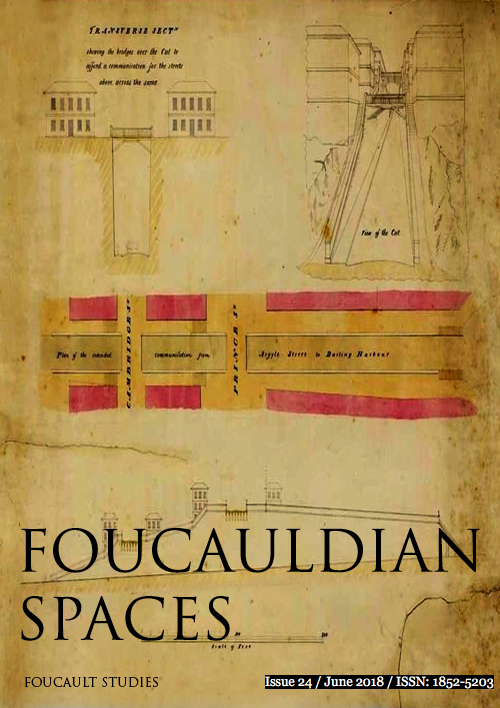Monsters of Sex: Michel Foucault and the Problem of Life
DOI :
https://doi.org/10.22439/fs.v0i24.5528Mots-clés :
, Foucault, Derrida, biopolitics, life, sex, monsters, problematizationRésumé
This article argues, contra-Derrida, that Foucault does not essentialize or pre-comprehend the meaning of life or bio- in his writings on biopolitics. Instead, Foucault problematizes life and provokes genealogical questions about the meaning of modernity more broadly. In The Order of Things, the 1974-75 lecture course at the Collège de France, and Herculine Barbin, the monster is an important figure of the uncertain shape of modernity and its entangled problems (life, sex, madness, criminality, etc). Engaging Foucault’s monsters, I show that the problematization of life is far from a “desire for a threshold,” à la Derrida. It is a spur to interrogating and critiquing thresholds, a fraught question mark where we have “something to do.” As Foucault puts it in “The Lives of Infamous Men,” it an ambiguous frontier where beings lived and died and they appear to us “because of an encounter with power which, in striking down a life and turning it to ashes, makes it emerge, like a flash [...].”
Références
• Colin Koopman, Genealogy as Critique: Foucault and the Problems of Modernity (Bloomington: Indiana University Press, 2013)
• Foucault, Discipline and Punish (New York : Vintage Books, 1995)
• Gary Gutting, Michel Foucault’s Archaeology of Scientific Reason (Cambridge: Cambridge University Press, 1989)
• Jacques Derrida, “Cogito and the History of Madness” in Writing and Difference (Chicago: The University of Chicago Press, 1978)
• Jacques Derrida, The Beast and the Sovereign (Chicago: The University of Chicago Press, 2009)
• Jemima Repo, “Herculine Barbin and The Omission of Biopolitics from Judith Butler’s Gender Genealogy.” Feminist Theory Vol 15 Issue 1 (2014): https://doi.org/10.1177/1464700113512737
• Judith Butler, Gender Trouble: Feminism and the Subversion of Identity (New York: Routledge, 1990)
• Ladelle McWhorter, Bodies and Pleasures: Foucault and the Politics of Sexual Normalization (Bloomington: Indiana University Press, 1999), 200 and 253. McWhorter notes that Herculine Barbin is not indexed in Alan Sheridan’s “guidebook,” Michel Foucault: The Will to Know (London: Tavistock, 1980).
• Ladelle McWhorter, Bodies and Pleasures: Foucault and the Politics of Sexual Normalization
• Lauren Guilmette, “The Violence of Curiosity: Butler’s Foucault, Foucault’s Herculine, and the Will-to-Know” philoSOPHIA Volume 7, Number 1 (Winter 2017): https://doi.org/10.1353/phi.2017.0000
• Lynne Huffer, “Foucault’s Fossils: Life Itself and the Return to Nature in Feminist Philosophy.” Foucault Studies No 20 (December 2015): https://doi.org/10.22439/fs.v0i0.4933
• Lynne Huffer, Mad for Foucault: Rethinking the Foundations of Queer Theory (New York: Columbia University Press, 2010)
• Mary-Beth Mader, “Modern Living and Vital Race: Foucault and the Science of Life” Foucault Studies No. 12 (2011)
• Michel Foucault, “Lives of Infamous Men,” in James Faubion (ed.), Power: Essential Works of Michel Foucault 1954-1984, (New York: The New Press, 2000)
• Michel Foucault, “My Body, this paper, this fire,” in History of Madness (New York: Routledge, 2006)
• Michel Foucault, “On Power,” in Politics, Philosophy, Culture: Interviews and Other Writings 1977-1984. Ed. Lawrence Kritzman (New York: Routledge, 1988)
• Michel Foucault, “Reply to Derrida” in History of Madness (New York: Routledge, 2006).
• Michel Foucault, “Structuralism and Post-structuralism” in Aesthetics, Method, and Epistemology: Essential Works of Foucault 1954-1984 (New Press: New York, 1998)
• Michel Foucault, “The Concern for Truth,” in Politics, Philosophy, Culture Ed. Lawrence Kritzman (Routledge: New York, 1988)
• Michel Foucault, Abnormal (Verso: London, 2003)
• Michel Foucault, Security, Territory, Population Lectures at the Collège de France, 1977-78 (New York: Palgrave McMillan, 2007)
• Michel Foucault, The History of Sexuality: Volume One (New York: Vintage Books, 1990)
• Michel Foucault, The Order of Things: An Archaeology of the Human Sciences (New York: Random House, 1994), 161.
• Michel Foucault, The Use of Pleasure (New York: Vintage Books, 1990), 12.
• Todd May, The Philosophy of Foucault (Montreal: McGill-Queen’s University Press, 2006)
• Verena Erlenbusch, “Foucault’s Sad Heterotopology of the Body” philoSOPHIA Volume 6, Number 2 (Summer 2016): https://doi.org/10.1353/phi.2016.0018
Téléchargements
Publié-e
Comment citer
Numéro
Rubrique
Licence
Authors retain copyright to their work, but assign the right of the first publication to Foucault Studies. The work is subject to a CC BY-NC-ND 4.0 license, but despite these restrictions, authors can take for granted that Foucault Studies will permit articles published in Foucault Studies to be translated or reprinted in another format such as a book providing a full reference is made to Foucault Studies as the original place of publication.



